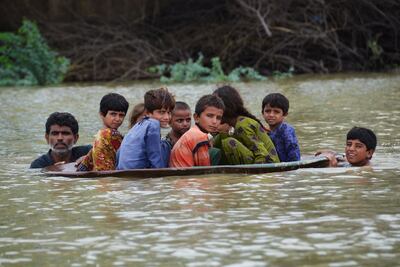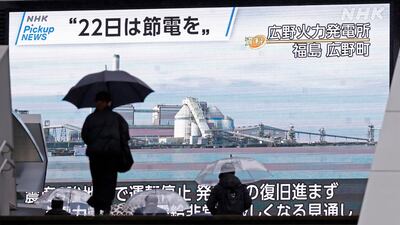It is perhaps human nature that many people plan for the worst-case scenario only when presented with an acute crisis – a health scare can prompt a lifestyle change; a financial blow or redundancy can push us towards saving and investing responsibly.
But when natural disasters, disease and global warming threaten millions of lives, entire cities or a whole economy, the need to look ahead and plan accordingly gains urgent and critical importance.
There is no shortage of threats to deal with. The horrific earthquake that tore apart southern Turkey and north-west Syria a week ago is a forceful reminder of our vulnerability to a natural phenomenon that the US Geological Survey has said is impossible for scientists to predict.
Less than a fortnight ago, a report from the Red Cross on future pandemics said “all countries remain dangerously unprepared for future outbreaks”.
And on global warming, the World Economic Forum’s Global Risks Report for 2023 released last month said “climate and environmental risks are the core focus of global risks perceptions over the next decade – and are the risks for which we are seen to be the least prepared”.
When faced with these dangers, a failure to prepare – such as by neglecting infrastructure, not developing early warning systems, or letting disease research fall behind – seems an obvious mistake to avoid. But when it comes to actually developing and adopting preparedness strategies, the challenges are many.
In some countries, governments – whose job it is to ensure their nations are prepared – come and go, and their action plans, time tables and commitments can be rewritten or even jettisoned when an electoral cycle puts a new party in power.
Fortifying buildings, protecting essential infrastructure, training and equipping rescue personnel or investing in research does not come for free, and there will always be complaints, particularly during tough economic times, that such preparation is too costly. This can make it difficult for officials or international agencies to propose essential but expensive strategies.
But what is the cost of failing to prepare? Aside from the irreplaceable loss of human life, earthquakes, eruptions and tsunamis smash roads, factories, hospitals, power plants and communications. Their loss makes normal economic life almost impossible and it can take countries decades to recover fully.
Last September, Pakistan was hit by devastating floods caused by torrential rains that scientists have said were fuelled by climate change. At least 1,700 people died and eight million were displaced. The country, which is not in a position to invest in preparedness, had to receive more than $8 billion in support from donors. Other countries that are vulnerable to such disasters could need much more in the future.
It is governments that command the ability to plan and enact preparations for an uncertain future
Planning ahead can be done and there are examples of extensive preparation to learn from. Japan – a famously earthquake-prone nation – is renowned for its strategic approach. Engineers there developed buildings with dampers that can absorb an earthquake’s energy or can move independently from the shaking ground below.
The World Bank has noted how Japan’s approach to planning, sharing preparedness knowledge and developing resilience through learning from and adapting to repeated earthquakes can “bear benefits not only in an emergency but in the everyday operations of organisations and countries”.
Other countries have also embraced the need to plan decades ahead. The UAE has many programmes to maintain and improve transport, industry and energy production, to name but a few. It has also adopted the National Food Security Strategy 2051.
Singapore, another economic powerhouse with a diverse expatriate population, has “steadily moved to reduce its vulnerability by building up coping mechanisms” according to the US Centre for Excellence in Disaster Management.
There is much expected of governments, according to Mohammed Al Gergawi, Minister of Cabinet Affairs and chairman of the World Government Summit, which is taking place in the UAE this week.
He told attendees that governments unable to transform or become more agile risked failing their people, adding that technology and artificial intelligence presented states with an incredible opportunity to improve lives.
That opportunity must be taken. Although international organisations and NGOs do sterling work – such as the Red Cross and Red Crescent Societies who already help many countries to identify risks and hazards – it is governments that command the ability to plan and enact preparations for an uncertain future.
None of this is to say that adopting long-term preparedness strategies will prevent death and destruction. Some things are beyond our control. But it is possible to start taking steps – now – to minimise the threats from the many crises facing us, both acute and chronic.
The Al Barzakh Festival takes place on Wednesday and Thursday at 7.30pm in the Red Theatre, NYUAD, Saadiyat Island. Tickets cost Dh105 for adults from platinumlist.net
The years Ramadan fell in May
The specs
Engine: 3.0-litre six-cylinder turbo
Power: 398hp from 5,250rpm
Torque: 580Nm at 1,900-4,800rpm
Transmission: Eight-speed auto
Fuel economy, combined: 6.5L/100km
On sale: December
Price: From Dh330,000 (estimate)
Killing of Qassem Suleimani
UAE currency: the story behind the money in your pockets
UAE currency: the story behind the money in your pockets
Zayed Sustainability Prize
Specs
Engine: Duel electric motors
Power: 659hp
Torque: 1075Nm
On sale: Available for pre-order now
Price: On request
What sanctions would be reimposed?
Under ‘snapback’, measures imposed on Iran by the UN Security Council in six resolutions would be restored, including:
- An arms embargo
- A ban on uranium enrichment and reprocessing
- A ban on launches and other activities with ballistic missiles capable of delivering nuclear weapons, as well as ballistic missile technology transfer and technical assistance
- A targeted global asset freeze and travel ban on Iranian individuals and entities
- Authorisation for countries to inspect Iran Air Cargo and Islamic Republic of Iran Shipping Lines cargoes for banned goods
The National's picks
4.35pm: Tilal Al Khalediah
5.10pm: Continous
5.45pm: Raging Torrent
6.20pm: West Acre
7pm: Flood Zone
7.40pm: Straight No Chaser
8.15pm: Romantic Warrior
8.50pm: Calandogan
9.30pm: Forever Young
Going grey? A stylist's advice
If you’re going to go grey, a great style, well-cared for hair (in a sleek, classy style, like a bob), and a young spirit and attitude go a long way, says Maria Dowling, founder of the Maria Dowling Salon in Dubai.
It’s easier to go grey from a lighter colour, so you may want to do that first. And this is the time to try a shorter style, she advises. Then a stylist can introduce highlights, start lightening up the roots, and let it fade out. Once it’s entirely grey, a purple shampoo will prevent yellowing.
“Get professional help – there’s no other way to go around it,” she says. “And don’t just let it grow out because that looks really bad. Put effort into it: properly condition, straighten, get regular trims, make sure it’s glossy.”
Tenet
Director: Christopher Nolan
Stars: John David Washington, Robert Pattinson, Elizabeth Debicki, Dimple Kapadia, Michael Caine, Kenneth Branagh
Rating: 5/5
KILLING OF QASSEM SULEIMANI
Red flags
- Promises of high, fixed or 'guaranteed' returns.
- Unregulated structured products or complex investments often used to bypass traditional safeguards.
- Lack of clear information, vague language, no access to audited financials.
- Overseas companies targeting investors in other jurisdictions - this can make legal recovery difficult.
- Hard-selling tactics - creating urgency, offering 'exclusive' deals.
Courtesy: Carol Glynn, founder of Conscious Finance Coaching
Killing of Qassem Suleimani
More coverage from the Future Forum
KILLING OF QASSEM SULEIMANI
The five pillars of Islam
Key findings of Jenkins report
- Founder of the Muslim Brotherhood, Hassan al Banna, "accepted the political utility of violence"
- Views of key Muslim Brotherhood ideologue, Sayyid Qutb, have “consistently been understood” as permitting “the use of extreme violence in the pursuit of the perfect Islamic society” and “never been institutionally disowned” by the movement.
- Muslim Brotherhood at all levels has repeatedly defended Hamas attacks against Israel, including the use of suicide bombers and the killing of civilians.
- Laying out the report in the House of Commons, David Cameron told MPs: "The main findings of the review support the conclusion that membership of, association with, or influence by the Muslim Brotherhood should be considered as a possible indicator of extremism."
ALRAWABI%20SCHOOL%20FOR%20GIRLS
%3Cp%3ECreator%3A%20Tima%20Shomali%3C%2Fp%3E%0A%3Cp%3EStarring%3A%C2%A0Tara%20Abboud%2C%C2%A0Kira%20Yaghnam%2C%20Tara%20Atalla%3C%2Fp%3E%0A%3Cp%3ERating%3A%204%2F5%3C%2Fp%3E%0A
The Voice of Hind Rajab
Starring: Saja Kilani, Clara Khoury, Motaz Malhees
Director: Kaouther Ben Hania
Rating: 4/5
Roll%20of%20Honour%2C%20men%E2%80%99s%20domestic%20rugby%20season
%3Cp%3E%3Cstrong%3EWest%20Asia%20Premiership%3C%2Fstrong%3E%0D%3Cbr%3EChampions%3A%20Dubai%20Tigers%0D%3Cbr%3ERunners%20up%3A%20Bahrain%0D%3C%2Fp%3E%0A%3Cp%3E%3Cstrong%3EUAE%20Premiership%3C%2Fstrong%3E%0D%3Cbr%3EChampions%3A%20Jebel%20Ali%20Dragons%0D%3Cbr%3ERunners%20up%3A%20Dubai%20Hurricanes%0D%3C%2Fp%3E%0A%3Cp%3E%3Cstrong%3EUAE%20Division%201%3C%2Fstrong%3E%0D%3Cbr%3EChampions%3A%20Dubai%20Sharks%0D%3Cbr%3ERunners%20up%3A%20Abu%20Dhabi%20Harlequins%20II%0D%3C%2Fp%3E%0A%3Cp%3E%3Cstrong%3EUAE%20Division%202%3C%2Fstrong%3E%0D%3Cbr%3EChampions%3A%20Dubai%20Tigers%20III%0D%3Cbr%3ERunners%20up%3A%20Dubai%20Sharks%20II%0D%3C%2Fp%3E%0A%3Cp%3E%3Cstrong%3EDubai%20Sevens%3C%2Fstrong%3E%0D%3Cbr%3EChampions%3A%20Dubai%20Tigers%0D%3Cbr%3ERunners%20up%3A%20Dubai%20Hurricanes%3C%2Fp%3E%0A
Killing of Qassem Suleimani
Killing of Qassem Suleimani
Evacuations to France hit by controversy
- Over 500 Gazans have been evacuated to France since November 2023
- Evacuations were paused after a student already in France posted anti-Semitic content and was subsequently expelled to Qatar
- The Foreign Ministry launched a review to determine how authorities failed to detect the posts before her entry
- Artists and researchers fall under a programme called Pause that began in 2017
- It has benefited more than 700 people from 44 countries, including Syria, Turkey, Iran, and Sudan
- Since the start of the Gaza war, it has also included 45 Gazan beneficiaries
- Unlike students, they are allowed to bring their families to France
UAE currency: the story behind the money in your pockets
Mohammed bin Zayed Majlis
Mohammed bin Zayed Majlis
More on animal trafficking
Key facilities
- Olympic-size swimming pool with a split bulkhead for multi-use configurations, including water polo and 50m/25m training lanes
- Premier League-standard football pitch
- 400m Olympic running track
- NBA-spec basketball court with auditorium
- 600-seat auditorium
- Spaces for historical and cultural exploration
- An elevated football field that doubles as a helipad
- Specialist robotics and science laboratories
- AR and VR-enabled learning centres
- Disruption Lab and Research Centre for developing entrepreneurial skills
Killing of Qassem Suleimani




